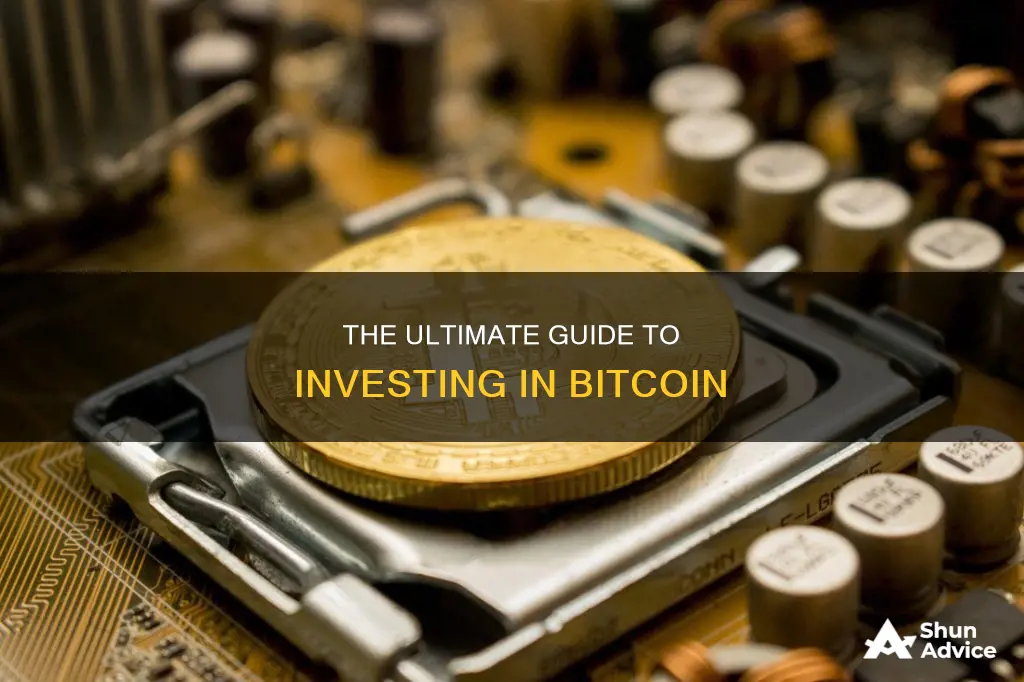
Investing in Bitcoin can be a daunting task for beginners, but there are several ways to buy and sell cryptocurrencies like Bitcoin. Here are some steps to help you get started:
1. Pick a Broker or Cryptocurrency Exchange: You can purchase Bitcoin through a broker like Robinhood or SoFi, or a cryptocurrency exchange like Coinbase, Gemini, or Binance. Brokers may charge higher fees but offer more security, while exchanges provide more options and flexibility but can be overwhelming for new investors.
2. Set Up an Account: You'll need to provide personal information and verify your identity, often through know your customer (KYC) protocols, to create an account on the platform you choose.
3. Add Funds to Invest: Fund your account by connecting it to your bank, initiating a wire transfer, or using a debit or credit card for payment. Credit card deposits are possible but may incur higher fees and interest rates.
4. Initiate Your Cryptocurrency Transaction: Decide on the amount of Bitcoin you want to buy and place your order through the exchange or broker. Many platforms allow you to purchase fractional shares of Bitcoin, making it accessible to those with smaller investment amounts.
5. Store Your Bitcoin: Once you've purchased Bitcoin, you'll need to store it in a digital wallet. This can be a hot wallet, which is connected to the internet and offered by the exchange, or a cold wallet, which is offline and provides more security but comes with the risk of losing access to your Bitcoin if the keycode is lost.
Remember, investing in Bitcoin and other cryptocurrencies is risky due to volatile price swings and potential regulatory changes. Always do your research, understand the tax implications, and only invest what you can afford to lose.
| Characteristics | Values |
|---|---|
| How to buy Bitcoin | Via cryptocurrency exchanges, traditional stockbrokers, money transfer apps, Bitcoin ATMs, Bitcoin exchange-traded funds, or peer-to-peer money transfer apps |
| How to store Bitcoin | In a hot wallet (online) or a cold wallet (offline) |
| Risks | Volatile prices, regulatory changes, fraud, security breaches, and permanent loss of access |
| Other considerations | Transaction fees, tax consequences, and the evolving nature of the cryptocurrency space |
What You'll Learn

Choosing a crypto-trading service or venue
There are several options for trading cryptocurrencies, including centralized exchanges, decentralized exchanges, and peer-to-peer money transfer apps. Centralized exchanges, such as Coinbase, Kraken, Gemini, and Binance, are the most common option. These exchanges require users to submit identifying documentation and follow laws and regulations. They offer a wide range of cryptocurrencies and features, such as the ability to set up recurring investments. However, they may charge high fees for deposits and transactions.
Decentralized exchanges, on the other hand, are largely automated and do not require users to submit personal information. While these exchanges offer lower transaction costs, they require more technical expertise and may not be suitable for those who don't already have cryptocurrency.
Another option is to use peer-to-peer money transfer apps, such as PayPal, Venmo, or Cash App, which allow users to purchase, store, send, and sell Bitcoin directly through the apps. These apps are convenient for those who are already familiar with their interfaces.
When choosing a crypto-trading service or venue, it is important to consider factors such as fees, the number of cryptocurrencies offered, security, and customer service. It is also crucial to use strong passwords and two-factor authentication to protect your account and personal information.
Dogecoin: The Only Crypto You Need
You may want to see also

Connecting your exchange to a payment option
Each exchange has different fees and fund settlement times depending on your chosen payment method, so it's important to select the best option for your needs. At most exchanges, you can connect your bank account directly or link it to a debit or credit card. While it's possible to use a credit card to purchase cryptocurrency, it's worth noting that the volatility of cryptocurrency prices, combined with a credit card's interest charges, could inflate the overall cost of buying tokens. Additionally, some banks may question or even stop deposits to crypto-related sites or exchanges.
Fees vary for deposits and withdrawals via different methods, and exchanges also charge fees per transaction. Therefore, it's essential to research and compare the fees associated with different payment options before making your choice.
Bitcoin Investment: Smart Move or Risky Gamble?
You may want to see also

Placing an order
There are several ways to invest in Bitcoin, and the first step is to join a Bitcoin exchange. These are the middlemen of cryptocurrency investing, like a stock brokerage. Some of the most popular options include Coinbase, Binance, Kraken, Gemini, and Bitfinex. It is important to do your research and choose an exchange that suits your needs.
Once you have chosen an exchange, you will need to get a Bitcoin wallet. There are two types of wallets: a "hot wallet" or a "cold wallet". A hot wallet is one that is operated by either your cryptocurrency exchange or by a third-party provider. Notable hot wallets include Electrum and Mycelium. However, hot wallets are not the most secure form of coin storage, as they are vulnerable to hacking.
Cold wallets, on the other hand, are actual pieces of hardware that store your coins, similar to a flash drive. Cold wallets are considered much more secure than hot wallets, but they typically cost between $60 to $100. Some popular cold wallets include Ledger Nano X, Trezor Model T, and CoolWallet S.
After you have obtained your wallet, you will need to link it to your bank account. This will enable you to purchase and sell coins. Alternatively, your bank account may be linked directly to your cryptocurrency exchange account.
Now you are ready to place your Bitcoin order. Your cryptocurrency exchange will facilitate the purchase, and you can decide how much Bitcoin you want to buy. It is important to note that the value of Bitcoin is highly volatile and investing in it can be very risky. Some coins cost thousands of dollars, but exchanges often allow you to buy fractions of a single coin, so your initial investment could be as low as $25.
When placing your order, carefully consider your risk tolerance and investment strategy. Bitcoin values may rise or fall dramatically in a very short period, so be prepared for potential losses as well as gains.
The Ultimate Guide to Investing in Dogecoin
You may want to see also

Safe storage
When it comes to storing your Bitcoin, there are two main options: hot wallets and cold wallets.
Hot wallets are online, software-based crypto wallets. Your account on a crypto exchange like Coinbase, Gemini, Kraken, or Crypto.com can be classed as a hot wallet because it's connected to the internet.
Cold wallets, on the other hand, are offline wallets. This can include hardware wallets, which are physical devices that connect to your computer and store cryptocurrency. Examples of hardware wallets include Ledger, Trezor, and SafePal. Cold wallets can also include paper wallets, which are a less popular option due to the fragility of paper.
When choosing a hot or cold wallet, it's important to consider the security, convenience, and cost of each option. Hot wallets are generally more convenient and easier to use, but they are also more vulnerable to cybersecurity threats and hacks. Cold wallets, on the other hand, are considered much more secure since they are offline, but they can be less convenient for frequent trading.
To ensure the safety of your Bitcoin, it's recommended to use a combination of hot and cold wallets. For example, you can use a hot wallet for smaller amounts of crypto that you want to have readily available for trading, while using a cold wallet for larger amounts that you want to hold as a long-term investment.
Additionally, it's important to keep your private keys and recovery phrases secure. Never store your private keys or recovery phrases on an internet-connected device or cloud backup service. Instead, consider keeping a physical record, such as a piece of paper or metal engraving stored in a safe.
Bitcoin Investment: Safe or Risky Bet?
You may want to see also

Understanding the risks
Bitcoin and other cryptocurrencies are high-risk investments, and it's important to be aware of the potential dangers before you begin. The market is volatile and unpredictable, with the price of bitcoin fluctuating on a daily basis. There is also a lack of regulation, leaving investors vulnerable to cyberattacks, hacking, fraud, and money laundering. Additionally, the decentralised status of bitcoin means there is no central authority to provide support or protection if things go wrong.
One of the biggest risks associated with investing in bitcoin is the volatile and fluctuating market. The price of bitcoin can change drastically in a short space of time, and there is no guarantee of getting a return on your investment. To minimise the risk of massive losses, it's recommended to make small, cautious investments and to keep a vigilant eye on the market.
Another significant risk is the threat of cyberattacks and hacking. As bitcoin is technology-based and reliant on digital storage, it is vulnerable to online fraud and cyber threats. If your bitcoin wallet or exchange account is compromised, there is often no way to retrieve your lost or stolen bitcoins. It's crucial to carefully research and invest in reliable security measures to protect your investment.
Fraud is also prevalent in the bitcoin market. The lack of regulation makes it easier for fraudulent exchanges and transactions to occur, duping unsuspecting investors out of their bitcoins. While efforts have been made to address this issue, security remains a significant concern.
The decentralised nature of bitcoin, while offering freedom from traditional financial institutions, also poses certain risks. The value of bitcoin is entirely dependent on the perceived value by its users, and without a central authority, investors may face legal and financial complications in the event of disputes or ownership issues.
It's also important to consider the legal and regulatory landscape surrounding bitcoin. The status of cryptocurrency is still evolving, and investors need to stay informed about the latest developments. In the US, for example, the IRS has defined cryptocurrencies as property, subject to capital gains tax laws. Understanding the tax implications and reporting requirements is essential to avoid penalties and fines.
In conclusion, investing in bitcoin carries significant risks that should not be taken lightly. It is a highly volatile and unpredictable market, prone to cyber threats and fraud, with limited regulatory protection. While bitcoin offers exciting opportunities, investors should approach it with caution, conducting thorough research and due diligence before making any decisions.
Coinbase Safety: Is Your Investment Secure?
You may want to see also
Frequently asked questions
There are many platforms that allow you to invest in Bitcoin, including Coinbase, Gemini, Kraken, Binance, Crypto.com, and Uphold.
Cryptocurrencies are highly volatile and experience dramatic price swings, so you have to be able to stomach price swings. There is also a risk of scams or fraud, and the lack of regulation means there is less investor protection.
You can get started with as little as $5 on most exchanges.
You will need to open an account with a cryptocurrency exchange, verify your identity, fund your account, and then place an order for Bitcoin.







